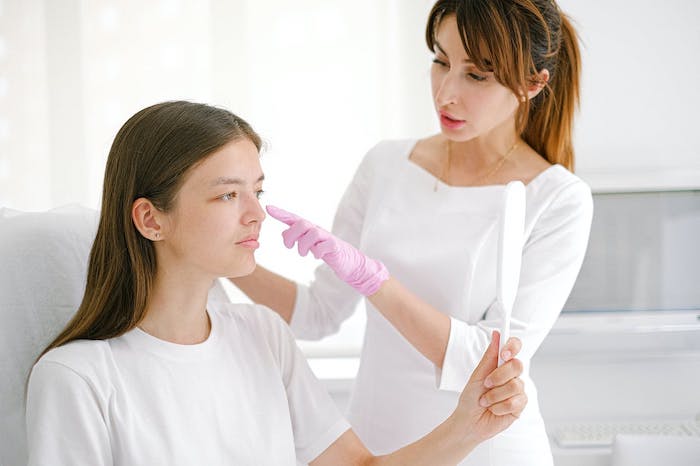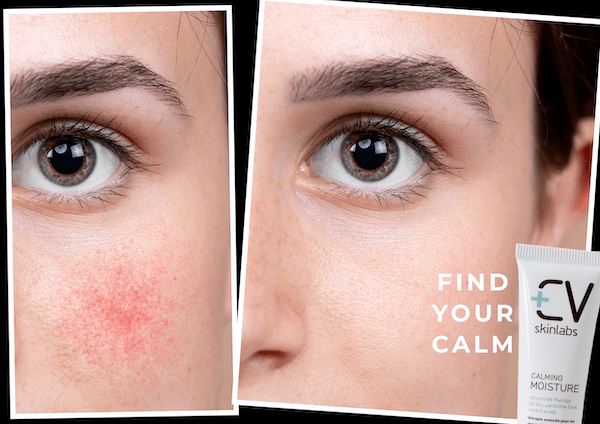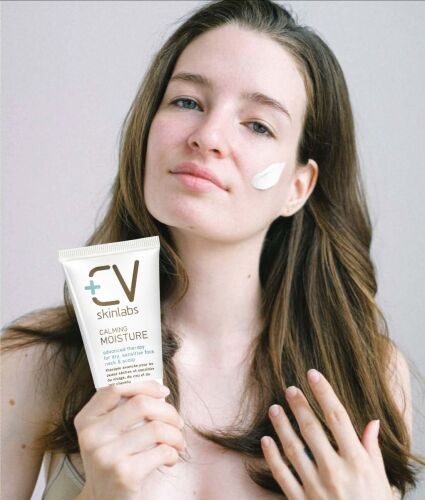
If you have hypersensitive skin, you may find it challenging to deal with at times.
Plus, it can be confusing to know what you should and shouldn’t do to encourage your skin to be healthy and smooth.
We tackle this challenging skin condition in this post.
Q1. What Is Hypersensitive Skin?
A1. Hypersensitive skin is the most sensitive of skin types. It has a compromised skin bcarrier, which means that it easily loses moisture and is vulnerable to irritants. Often called “overreactive,” hypersensitive skin overreacts to factors that would be easily tolerated by normal skin.
Those with eczema, rosacea, psoriasis, and other skin conditions often consider their skin to be hypersensitive.
Q2. What Are the Symptoms of Hypersensitive Skin?
Hypersensitive skin reacts to various triggers with symptoms like the following:
- Redness
- Irritation
- Stinging and burning
- Itching
- Dryness and flakiness
- Acne
- Hyperpigmentation
- Inflammation
- Rashes and hives
Triggers for these unpleasant symptoms may include:
- Certain skin care products like cleansers and creams
- Some makeup products
- Fragrances
- Over-exfoliation
- Environmental pollution
- Harsh weather including wind and sun
- Sharp changes in temperature
- Fabrics and dyes
- Detergents
- Stress
- Spicy foods and/or alcohol
- Allergens such as pollen, animal dander, mold, and dust
Q3. What Causes Hypersensitive Skin?
A3. It’s not always easy to determine what may be causing hypersensitive skin, but one thing is constant: it always involves a compromised outer barrier.
Healthy skin has an outer barrier that protects it. This barrier keeps the bad stuff out and the good stuff (like moisture and antioxidants) in. When this barrier is compromised, it’s like a wall becoming a net.
Suddenly there are cracks and fissures through which irritants can penetrate the skin. When they do, the over-stimulated sensory fibers in the outer layer react faster and stronger than those in normal skin. They trigger unpleasant symptoms like stinging, burning, tightness, and the rest.
Scientists also believe that hypersensitive skin involves a reactive immune system. Similar to the way the immune system overreacts in people with psoriasis, it may also be in overdrive in people with hypersensitive skin. This is what causes the skin to react more strongly to triggers than it otherwise might, as the immune system sees them as “threats” that it must neutralize, and responds with inflammation, redness, hives, itching, and other allergenic symptoms.
Q4. Did I Cause My Hypersensitive Skin?
A4. Often, hypersensitive skin is hereditary like other skin conditions. You were born with a reactive immune system, maybe, or you have eczema or psoriasis, so your skin is hypersensitive.
Sometimes, though, you can cause hypersensitivity if you overuse certain skincare products.
Over-exfoliating skin, for example, can lead to hypersensitive skin over time. Exfoliation is important for sloughing off dead skin cells and allowing more youthful skin cells to rise to the top. But if you exfoliate too often, you can damage the outer layer, leading to skin that is more reactive to skin care products and other triggers.
Q5. What’s the Difference Between Sensitive and Hypersensitive Skin?
A5. How do you know if you have sensitive skin, or if your skin might be hypersensitive?
It’s a matter of degree. If you have sensitive skin, you may have trouble using retinol products, for example, without breaking out. Or you may have to be careful which cleansers you use. But as long as you properly care for your skin, it looks healthy and feels comfortable.
If you have hypersensitive skin, it’s more of a constant issue in your life. It may seem like every little thing causes your skin to react. You have a sudden cold day and wham, you’ve got redness. Try a new blush and here comes the acne. You get stressed out at work and end up with inflammation and hives.
Q6. Is There a Cure for Hypersensitive Skin?
A6. If your hypersensitive skin is hereditary, you won’t be able to cure it completely. You can learn to manage it so that it’s not a constant problem.
If your skin is hypersensitive because of allergens or overuse of harsh products, you may be able to “cure” it by avoiding those allergens and harsh products.
The key is to adopt a preventative program for optimal skin health. This program should include avoiding your triggers and adopting a targeted routine to help promote skin repair.
Q7. How Do I Manage My Hypersensitive Skin?
We recommend the following steps to help manage and care for your hypersensitive skin.
A. Identify Your Triggers
Keep a diary for two weeks. In that diary, write down everything you do and everything your skin is exposed to, then how your skin reacts.
Things to include:
- What you eat
- What skin care products you use
- What makeup products you use
- What hair-care products you use (in case some of those get on your face)
- What fabrics touch your skin
- What laundry products you use
- What foods you eat
- What weather you are exposed to
- Any medications you’re taking (including supplements)
- Any hormonal changes (your menstrual period or menopausal symptoms)
- Any stress you may experience that creates strong emotions
- Any air freshener products you may be exposed to
After two weeks, review your diary and see if you can identify your triggers. Choose those things you think may be bothering your skin and eliminate them from your daily routine. Then continue with your diary for another two weeks. Continue this process until you think you’ve found most of your triggers and your skin is reacting less often.
B. Simplify Your Skincare Routine
Next, get back to the basics of your skincare routine. For two weeks, pare down your routine. Only cleanse, tone, and moisturize your skin with gentle products.
- Cleanser: Choose something with a cream or gel consistency. Avoid foaming cleansers as they can exacerbate inflammation.
- Toner: Avoid those with alcohol and choose gentle, hydrating toners. We recommend our Rescue + Relief Spray as it helps instantly tame inflammation while preparing skin for moisturizer. It not only hydrates, but treats and balances skin.
- Moisturizer: Look for a product with soothing and anti-inflammatory ingredients. We recommend our Calming Moisture, as it has aloe, beta-glucan (from oat kernels), and oat extract (gluten-free) to reduce redness and itch and calm skin down. It’s rich in antioxidants, ceramides and healing ingredients to dramatically improve skin.
Note: All CV Skinlabs products are clinically proven to help sensitive skin soothe, repair and transform to healthier skin.
Once your skin calms down, gradually add one product at a time to see how your skin reacts to it. (If your skin doesn’t calm down while you’re using only the three basics, consider that your cleanser, toner, or moisturizer may be too harsh, and look for something else.)
C. Avoid Triggering Ingredients In Your Products
While you’re getting back to the basics, take a look at your skincare products. Turn them over and read the ingredient list. In general, you want to avoid those products with the following ingredients and look for those that are clean and simple.
- Synthetic fragrances
- Alcohols
- Sulfates
- Parabens
- Chemical sunscreens
- Harsh exfoliants
- Preservatives like DMDM hydantoin, quaternium-15, butylated hydroxyanisole
By the way, all of our CV Skinlabs products were developed for the special needs of hypersensitive skin. They are 100 percent free of any allergenic or harsh ingredients, plus they will encourage the repair of the outer barrier. If you use them regularly, you will notice that your skin becomes less reactive and more radiant!
D. Reduce Your Daily Stress
If stress and strong emotions trigger your hypersensitive skin, try to incorporate more stress-relieving activities into your daily life. Good options include daily exercise, meditation, warm baths, deep breathing, walks in nature, time with positive people, listening to uplifting music, yoga, art therapy, crafting, and spending time with pets.
E. Stay Hydrated
In addition to regularly moisturizing your skin with a quality moisturizer (we suggest our Calming Moisture), drink at least eight glasses of water per day. Staying hydrated from the inside out also helps your skin to look and feel its best.
F. Use the Right Face Masks
Avoid any peel-off or exfoliating masks, as these can further irritate your skin. Instead, choose a soothing, nutrient-rich clay mask once or twice a week. It won’t strip the skin of its protective layer, but it will soothe damaged skin and help encourage repair. A moisturizing mask with aloe vera and other gentle ingredients may also be a good idea.
How do you manage hypersensitive skin?
Featured image courtesy Anna Shvets of Pexels.




